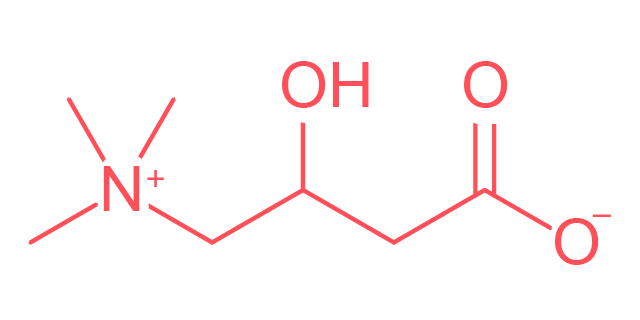Carnitine

Linear Formula
C7H15NO3
Synonyms
L-carnitine, 3-hydroxy-4-N-trimethylammoniobutanoate, Levocarnitine
Share this metabolite
Carnitine, or L-carnitine, is an amino acid derivative and micronutrient. Amino acid derivatives, such as L-carnitine, serotonin, and GABA, are made from essential amino acids but are not incorporated into proteins. Instead, they play important roles in the body’s energy metabolism. Carnitine is found in meat and dairy products and is thus absorbed from food, but it is also produced by the human body. Since L-carnitine is a key player in the cell’s energy production, it impacts several metabolic functions, including regulating body weight, exercise performance, and neural health.
Carnitine and diet
L-carnitine is a vital molecule found in all living cells where it contributes to producing energy from fatty acid degradation. The liver, brain, and kidneys synthesize L-carnitine from the amino acids lysine and methionine and distribute the molecule throughout the body.
About 80% of the overall carnitine content in the body derives from eating animal products, mainly marine fish, red meat, poultry, and milk. Vegetarians were shown to have higher L-carnitine absorption rates than people eating meat. Additionally, body composition, exercise habits, and gender contribute to inter-individual carnitine levels1. Excess dietary carnitine is either eliminated in the urine or degraded by microorganisms in the large intestine.
Carnitine and exercise
Inside body cells, L-carnitine binds to long-chain fatty acids and transports them across the mitochondrial membrane. Once inside the mitochondria, the fatty acids are shortened, which releases energy for the cell to function properly. L-carnitine is transported outside of the mitochondria, where it then picks up another fatty acid for the carnitine cycle to start again.
As such, L-carnitine is involved in the energy metabolism of skeletal muscles and has a major impact on physical performance. During low to moderate exercise, L-carnitine supplementation was shown to save the muscle’s glycogen and instead stimulate fatty acid oxidation leading to higher energy production and loss of body weight2.
Similarly, L-carnitine prevents the degradation of amino acids and shifts towards fatty acid oxidation for energy production. This makes free amino acids available for the synthesis of proteins—the building blocks for muscle tissue. Research studies found that dietary carnitine intake in athletes results in increased muscle L-carnitine content and increased muscle mass3.
Due to its antioxidant effect, L-carnitine also protects muscles from disruption after strenuous exercise, helps muscles to recover, and reduces muscle soreness. Several studies support these findings showing that post-training L-carnitine supplementation alters muscle fuel metabolism and improves overall muscle health while relieving muscle pain, tenderness, weakness, and injury. This effect is even more pronounced in elderly people since overall L-carnitine levels decrease with age. Therefore, L-carnitine as a dietary supplement has beneficial effects on muscle mass and function.
Carnitine and fertility
L-carnitine and its derivatives impact the fertility of both men and women by controlling energy metabolism and via antioxidant effects. In men, L-carnitine supports energy production in sperm, improving sperm motility. L-carnitine supplementation has been shown to enhance male fertility4.
Similarly, dietary supplementation with L-carnitine is suspected to improve female reproductivity due to its antioxidant effects. Supplemental L-carnitine seemed to improve the health and maturation of oocytes and the development of embryos. Additionally, patients with endometriosis and polycystic ovary syndrome (PCOS) showed improved hormonal profiles as well as decreased blood glucose levels and improved insulin resistance5.
Carnitine in disease and therapy
Since L-carnitine impacts the energy metabolism of almost every cell, carnitine depletion can manifest as age-related chronic and degenerative diseases. Several diseases and conditions like kidney disease, fatty liver disease, insulin resistance, neurodegenerative diseases, fertility disorders, and endocrine imbalances are linked to alterations in the carnitine cycle6. Intake of L-carnitine supplements has been shown to be an efficient therapeutic approach to treat disorders caused by L-carnitine deficiencies.
Additionally, L-carnitine impacts the fatty acid metabolism of the skeletal muscle, liver, and cardiovascular system. L-carnitine supplements were shown to improve cardiovascular disease, hypertension, muscle waste, muscle loss, inflammation, and obesity and might therefore be a promising therapy for stress, insulin resistance, heart attacks, and even aging.
Especially in the treatment of neurological illnesses, supplemental L-carnitine shows potential. The derivative acetyl-L-carnitine plays a crucial role in cognitive function, and L-carnitine supplementation improves the behavior of aging people, patients with Alzheimer’s disease, and patients with Parkinson’s disease. Similarly, L-carnitine supplementation helped patients with Autism Spectrum Disorder with their behavioral and cognitive function7.
Metabolon’s Global Discovery and Glucose Intolerance Metabolites Targeted Panel
Metabolon’s Global Discovery Panel measures over 1,000 small molecules, including carnitine. Additionally, the Glucose Intolerance Metabolites Targeted Panel measures Hydroxyisovaleroyl carnitine (carnitine bound to a fatty acid). Metabolon has created a suite of tools built from decades of experience across thousands of metabolomics studies to help you understand the crucial role of amino acid derivatives in disorders and pathways. Contact us today to learn more about how Metabolon can help you advance your research.
References
- Alhasaniah AH. l-carnitine: Nutrition, pathology, and health benefits. Saudi J Biol Sci 2023;30(2):103555.
- Fielding R, Riede L, Lugo JP et al. l-Carnitine Supplementation in Recovery after Exercise. Nutrients 2018;10(3):349.
- Gnoni A, Longo S, Gnoni GV et al. Carnitine in Human Muscle Bioenergetics: Can Carnitine Supplementation Improve Physical Exercise? Molecules 2020;25(1):182.
- Aliabadi E, Soleimani Mehranjani M, Borzoei Z et al. Effects of L-carnitine and L-acetyl-carnitine on testicular sperm motility and chromatin quality. Iran J Reprod Med 2012;10(2):77–82.
- Agarwal A, Sengupta P, and Durairajanayagam D. Role of L-carnitine in female infertility. Reprod Biol Endocrinol 2018;16(1):5.
- Virmani MA, Cirulli M. The Role of l-Carnitine in Mitochondria, Prevention of Metabolic Inflexibility and Disease Initiation. Int J Mol Sci 2022;23(5):2717.
- Kepka A, Ochocinska A, Borzym-Kluczyk M et al. Preventive Role of L-Carnitine and Balanced Diet in Alzheimer’s Disease. Nutrients 2020;12(7):1987.

